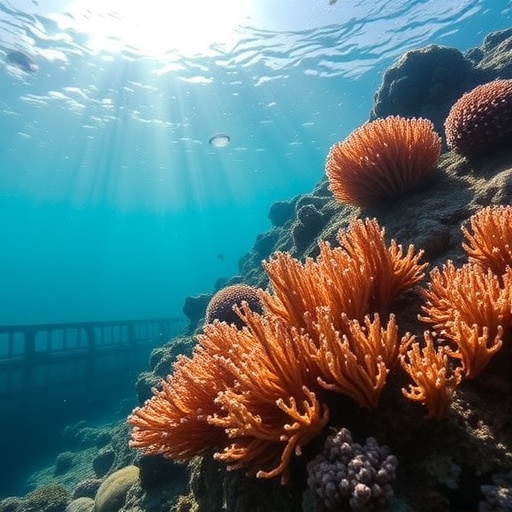In recent years, the resilience of coral reefs, the bedrock of ocean biodiversity, has been called into question amid escalating climate change impacts. A groundbreaking study conducted by researchers at the University of Colorado Boulder now sheds new light on how these delicate organisms might possess an unexpected capacity to withstand one of the most insidious threats they face: ocean acidification. Published in the prestigious journal Science Advances, this research offers a technical deep dive into corals’ skeletal formation processes, revealing mechanisms that allow certain species to adapt to increasing ocean acidity—a phenomenon linked with human-induced carbon dioxide emissions.
Ocean acidification results from the ocean’s absorption of roughly 30% of anthropogenic CO2, which chemically reacts with seawater to lower its pH. Since the Industrial Revolution, the ocean’s surface waters have experienced a 40% increase in acidity, altering the delicate chemical balance essential to the formation of calcium carbonate, the mineral basis of coral skeletons. The decreased availability of carbonate ions is theorized to undermine coral calcification, potentially leading to fragile skeletal structures that jeopardize reef stability. However, existing empirical data from laboratory and field experiments have produced mixed signals regarding the degree of acidification impact on coral growth and skeleton density.
Employing Raman spectroscopy—a sophisticated analytical method that utilizes laser light to elucidate molecular structure—the study analyzed the chemical composition and microstructural integrity of two historical coral skeleton samples, aged approximately 200 and 115 years respectively. These specimens, sourced from the Great Barrier Reef and the Coral Sea, were scrutinized for evidence of changes in their crystalline calcium carbonate matrix under conditions of progressive ocean acidification. Raman spectroscopy provided unprecedented resolution into molecular ordering, detecting subtle variations in mineral impurities that influence skeletal robustness.
The principal investigator, Jessica Hankins, a doctoral candidate in Geological Sciences, identified that despite the increase in ocean acidity over two centuries, the coral specimens maintained their ability to regulate the chemistry of their calcifying fluid—a semi-isolated microenvironment situated between the growing skeleton and overlying soft tissues. This regulation effectively sustains supersaturation conditions favoring calcium carbonate precipitation, thus enabling continuous skeletal growth. Intriguingly, while conditions conducive to rapid calcification corresponded with heightened molecular disorder due to the incorporation of extraneous ions, the corals prioritized growth rates, suggesting an evolved flexibility in their biomineralization pathways.
The study’s findings challenge conventional assumptions that ocean acidification invariably compromises coral skeletal density. Instead, they unveil a nuanced biological response where corals manipulate internal geochemical processes to mitigate external environmental stressors. This insight prompts a reassessment of coral resilience thresholds and indicates that the calcifying fluid functions as a critical buffer zone, mediating mineral ion transport and facilitating skeletal construction despite declining oceanic carbonate availability.
Nonetheless, the molecular mechanisms underlying this regulatory capacity remain not fully characterized. Hankins emphasizes that the complexity of coral physiological responses demands more comprehensive investigations across diverse species and geographic locales to ascertain the generality and limits of this adaptation. The temporal scope of such resilience also calls for longitudinal monitoring to evaluate whether prolonged acidification will eventually overwhelm these compensatory processes.
Beyond the chemical challenge posed by acidifying oceans, coral reefs endure multiplicative stress from rising sea surface temperatures, anthropogenic pollution, and unsustainable fishing, all contributing to widespread coral bleaching events. Bleaching is characterized by the expulsion of symbiotic algae essential for coral metabolism, debilitating reef vitality. Alarmingly, between 2023 and mid-2024, mass coral bleaching afflicted at least 62 countries and territories, highlighting the precarious state of reef ecosystems globally.
Coral reefs are keystone ecosystems, underpinning marine biodiversity hotspots, providing nursery habitats for vital fish populations, and shielding coastlines from erosion and severe weather impacts. The integrity of the calcified reef framework is paramount; any decline in skeletal density or morphological complexity can cascade into ecological instability, threatening myriad species reliant on coral habitats.
This research contributes a hopeful dimension to coral reef conservation narratives by demonstrating intrinsic biological responses that may afford the reefs a degree of buffering against ocean acidification. However, scientists caution against complacency, recognizing that such resilience is not a panacea. Multifaceted environmental pressures persist, and effective global mitigation of climate change remains imperative to safeguard these ecosystems for future generations.
Moreover, Hankins’ work underscores the interconnectedness of global ecosystems; transformations in ocean chemistry reverberate beyond marine boundaries, influencing planetary health at large. As she articulates, even regions distant from the sea, such as Colorado, are entwined in the ocean’s fate, emphasizing the universal stakes of coral reef preservation efforts.
In summary, this pioneering study leverages cutting-edge Raman spectroscopic techniques to reveal that coral skeleton biomineralization exhibits adaptive regulation in the face of rising ocean acidity. While this discovery instills cautious optimism, it simultaneously calls for expanded research and concerted conservation strategies to fully elucidate and harness coral resilience amid accelerating environmental change.
Subject of Research: Coral resilience to ocean acidification and biomineralization mechanisms under changing ocean chemistry
Article Title: Corals Show Adaptive Regulation of Skeletal Calcification Amid Two Centuries of Ocean Acidification
News Publication Date: August 27, 2024
Web References: DOI: 10.1126/sciadv.adr0264
Image Credits: Jessica Hankins
Keywords: Coral reefs, ocean acidification, biomineralization, Raman spectroscopy, calcifying fluid, calcium carbonate, skeletal formation, climate change, coral resilience, marine ecosystems




